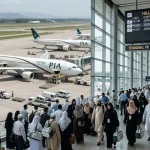
Minister of Climate Change and Environment
The Minister of Climate Change and Environment, Maryam bint Muhammad Al Muhairi, led the UAE delegation at the international conference held in Geneva today, which was organized by the Pakistani government and the United Nations in the presence of the Prime Minister of Pakistan, Muhammad Shahbaz Sharif, and the Secretary-General of the United Nations, Antonio Guterres, to discuss mechanisms for mobilizing international support for those in need.
In her speech at the conference, Maryam Al Muhairi stated that the United Arab Emirates supports all international efforts to enhance emergency relief, rehabilitation, reconstruction, and prevention in the wake of the unprecedented floods that swept Pakistan in 2022, noting that the humanitarian response in this regard came to meet urgent needs and reach areas. stricken and affected to ensure access to the basic needs of the population and improve living conditions.
Forms of Food and Medicine Supplies
She added: “Extending a helping hand to those affected, and ensuring that all forms of food and medicine supplies and basic needs are sent, are among the firm values of the state since its inception, as the provision of humanitarian aid is an essential component of the state’s foreign policy, as it was one of the first countries to respond to the crisis and hurriedly inaugurated a bridge Air and sea, which included the dispatch of 71 aircraft and 6 ships with tons of humanitarian aid.”
The UAE has donated more than $2.4 billion in humanitarian and development supplies to Pakistan over the past five years, including more than 647 million doses of polio vaccination to 119 million children between 2014 and 2022, for which $53 million has been budgeted.
The vaccine program will continue from 2023 to 2026 as part of the Global Polio Eradication Initiative.
Minister of Climate Change and Environment
At the conclusion of her speech, the Minister of Climate Change and Environment stated that the United Arab Emirates is committed to moving forward in terms of mobilizing international efforts in addressing climate challenges, within the context of its readiness to host the Conference of the Parties to the United Nations Framework Convention on Climate Change at its twenty-eighth session, COP28, this year, which presents an opportunity for close collaboration.
With the international community, search for effective and sustainable solutions to mitigate climate change and give priority to economic growth, through a comprehensive approach that takes into account the interests of developing countries, including Pakistan, that suffer the repercussions of climate change, in order to achieve a more rapid economic recovery and to increase our adaptability to future challenges.
UAE’s Generous Helping Hand
According to the United Nations, the enormous floods caused by melting glaciers and record monsoon rains last year affected more than 33 million Pakistanis, killed more than 1,700 people, and pushed another nine million into poverty.
In Sindh and Balochistan, the two worst-affected provinces, thousands of people are still living in open places, tents, and temporary dwellings, and stagnant water is still prevalent in many regions.
Pakistan’s Deputy Foreign Minister
Pakistan’s Deputy Foreign Minister Hina Rabbani Khar stated that the final count exceeded the international community’s goal.
Pakistan compiled a Post-Disaster Needs Assessment (PDNA) study with the assistance of the United Nations and other international organizations, which projected the country required $16.3 billion to reconstruct its economy and infrastructure and requested international assistance.
Financing for Pakistan
In December, the United Nations reported that despite a request for $816 million in urgent financing for Pakistan, it only got $262 million, or 32 percent of the intended amount.
The floods occurred in the midst of a severe economic crisis in Pakistan, which last month saw its foreign reserves dwindle to less than $6 billion, just enough to fund imports for one month.
Read More | Sheikh Mohamed bin Zayed welcomes Pakistan’s Chief of Army Staff
Read More | Army chief meets Saudi defence minister, agrees to increase cooperation
Financial Aid from IMF
Pakistan is also seeking quick financial aid from the International Monetary Fund and friendly nations such as Saudi Arabia and China in an effort to stabilize its struggling economy and avoid a default.
The bilateral ties between the United Arab Emirates and Pakistan are obtaining new dimensions on all political, economic, and social fronts, transforming into a strategic partnership based on trust.
Humanitarian Help
Since its inception, the United Arab Emirates has been renowned for its tremendous humanitarian help, stability, tolerance, creativity, and vision for improved health and education.
UAE is one of the main investors in the nation, but bilateral commerce and people-to-people ties have gradually increased over the years.
Bilateral Relations Between the Two Nations
Sheikh Zayed bin Sultan Al Nahyan, the creator of the United Arab Emirates, wanted to provide the bilateral relations between the two nations an immediate boost. H.H. Sheikh Khalifa Bin Zayed Al Nahyan, President of the United Arab Emirates, and H.H. Sheikh Mohammed bin Rashid al Maktoum, Vice-President, Prime Minister, and Ruler of Dubai, provided further support and assistance.
Both nations reiterate their strong commitment to further strengthen the bonds of friendship, and they emphasize the need to broaden the scope of their bilateral cooperation in a variety of disciplines that represent their deep-rooted and historic relationships.
Approximately 1,6 million Pakistani expats are employed in the UAE.
Pakistan’s Macroeconomy
They sent the biggest remittances in the current fiscal year, totaling $4.45 billion, which contributed greatly to Pakistan’s macroeconomy.
The UAE Pakistan Assistance Program was launched in January 2011 at a total cost of US$450 million for the reconstruction of infrastructure damaged by devastating floods and natural disasters in Khyber Pakhtunkhwa province, Bajaur and South Waziristan districts of the tribal belt in order to create jobs and improve the quality of life for the local population.
The Project will concentrate on four key areas: education, public health, roads, bridges, and water treatment plant and network supply.
National Crises Caused by Natural Disasters
In times of national crises caused by natural disasters, the leaders of the UAE have always sent teams and relief supplies to the country in order to alleviate the suffering of those impacted.
Teams from the UAE Military Relief Force, charitable foundations, and organizations played a responsible role in the rescue, distribution of supplies, and rehabilitation of earthquake and flood victims in the most flood-affected regions of Punjab, Sindh, Khyber Pakhtunkhwa, and Balochistan Provinces using Chinooks helicopters.
UAE Military Field Hospitals
In several distant regions of the country, UAE Military Field Hospitals were established in order to treat thousands of flood victims and conduct required immunization programs to save the lives of children, women, and the elderly. In accordance with the orders of HH the President of UAE.
UAE and Pakistan’s Democratic Allies UAE played a crucial role in establishing Friends of Democratic Pakistan (FoDP). Initially, UAE held several meetings (ministerial and public-private conferences) of FoDP and did its best to convey the purpose, significance, and utility of this forum to the international community and Pakistan’s socioeconomic growth. The UAE government has often underlined its commitment to helping Pakistan overcome its macroeconomic woes.



